 Entrapment by the pectoralis minor muscle can block blood and nerve flow to the arms causing pain, tingling, numbness (dysesthesia) and unusual sensations (parasthesias). The pectoralis minor’s very strong tendon overlies the brachial plexus of nerves and the axillary artery that make up the neurovascular bundle that serves the arm. When the muscle is tight or when Trigger Points chronically shorten the muscle, the tendon presses on these important structures. You will feel the entrapment as numbness when your arms are overhead. Trigger Points and blocked blood flow can cause pain.
Entrapment by the pectoralis minor muscle can block blood and nerve flow to the arms causing pain, tingling, numbness (dysesthesia) and unusual sensations (parasthesias). The pectoralis minor’s very strong tendon overlies the brachial plexus of nerves and the axillary artery that make up the neurovascular bundle that serves the arm. When the muscle is tight or when Trigger Points chronically shorten the muscle, the tendon presses on these important structures. You will feel the entrapment as numbness when your arms are overhead. Trigger Points and blocked blood flow can cause pain.
Posture at the computer or desk is important to note here. The pectoralis minor muscle rounds the shoulders forward into the cool American slouched posture you see everywhere. For students with a heavy backpack, a tight strap can press on the muscle or it can become tight by thrusting the shoulders forward and down while trying to hold up the backpack. Walking with crutches or a cane has the same effect.
Therapeutic correction using Neuromuscular Therapy involves manual release of tension and Trigger Points in the pectoralis minor muscle, assisted stretches rotating the bent arm backward into external rotation using Active Isolated Stretching techniques and strengthening the lower trapezius muscle. Personal correction can be achieved by using the Doorway Stretch, correcting standing and seated posture, avoiding heavy loads or adding padding to shoulder straps, avoiding sleeping curled up on your side, and practicing deep breathing that fills the lungs while pulling the shoulder blades down as if trying to tuck them into your back pockets.
Here’s the doorway stretch. If you feel numbness with your arms up, drop them down by your sides between each repetition. In each position, using Active Isolated Stretching protocol: squeeze your “wings” together to stretch the chest, assist the stretch by the pressing against doorjamb for two seconds, relax and repeat 10 times.

This is a series on arm and hand pain from my Neuromuscular Therapy center near Boston. If you missed the beginning, go back to the “Checklist of Causes.”